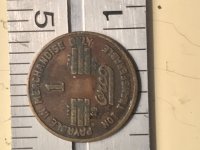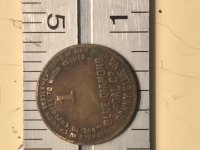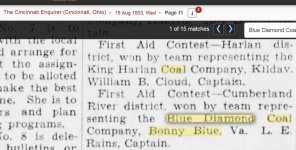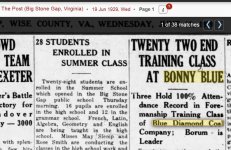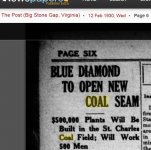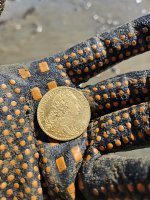Navigation
Install the app
How to install the app on iOS
Follow along with the video below to see how to install our site as a web app on your home screen.
Note: This feature may not be available in some browsers.
More options
You are using an out of date browser. It may not display this or other websites correctly.
You should upgrade or use an alternative browser.
You should upgrade or use an alternative browser.
✅ SOLVED Blue Diamond Coal Token?
- Thread starter ColtsPop
- Start date
This Ad from 1939 Mentions Them
View attachment 1854711
View attachment 1854712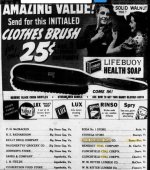
Also Saw a 1946 Mention of the Place as Making a donation
View attachment 1854711

View attachment 1854712

Also Saw a 1946 Mention of the Place as Making a donation
Last edited:
Upvote
0
Upvote
0
Red-Coat
Gold Member
Cool piece of history. It’s a company ‘scrip’ token (for 1 cent), issued to workers in a range of values and intended to be redeemable only in that company’s store(s) by an employee for goods and provisions. Sometimes they were part of, or a supplement to, an employee’s wages but also, cynically, many manual labourers were paid entirely in scrip. They were also given as an advance against unearned wages and were generated in such quantity that they often became an additional unofficial currency of local and surrounding communities where the issuing company was based. Not necessarily at full exchange rate, though.
You can see how such a system is open to abuse. Company stores with ‘locked-in’ customers could unfavourably manipulate their pricing; control the availability of alcohol which might reduce productivity; and freely issuing advances in this way also sucked some employees into being almost permanently indebted to the company they worked for. The use of company scrip instead of wages was prohibited in the US in 1938 but wasn’t completely eradicated as a part-payment until the late 1950s. There have been occasional instances of illegal use since then. The date for your token is 1948.
The Blue Diamond Coal Company was founded in Chevrolet, Kentucky in 1918 and is still in operation today (out of Knoxville, KY). Your particular token was issued for their mine in Bonny Blue, Virginia. The token design is generic. I’ve seen the same design with the Amherst Coal Company name on it. It’s said that around 75% of all scrip issued in America came from coal companies in Eastern Kentucky, West Virginia and Virginia.
You can see how such a system is open to abuse. Company stores with ‘locked-in’ customers could unfavourably manipulate their pricing; control the availability of alcohol which might reduce productivity; and freely issuing advances in this way also sucked some employees into being almost permanently indebted to the company they worked for. The use of company scrip instead of wages was prohibited in the US in 1938 but wasn’t completely eradicated as a part-payment until the late 1950s. There have been occasional instances of illegal use since then. The date for your token is 1948.
The Blue Diamond Coal Company was founded in Chevrolet, Kentucky in 1918 and is still in operation today (out of Knoxville, KY). Your particular token was issued for their mine in Bonny Blue, Virginia. The token design is generic. I’ve seen the same design with the Amherst Coal Company name on it. It’s said that around 75% of all scrip issued in America came from coal companies in Eastern Kentucky, West Virginia and Virginia.
Last edited:
Upvote
0
Users who are viewing this thread
Total: 2 (members: 0, guests: 2)
